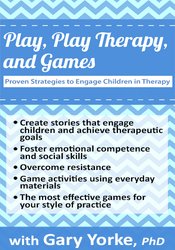

This dynamic and engaging workshop is perfect for adding play clinical therapy strategies and techniques to your repertoire. You will learn practical and engaging strategies to use immediately, for children with ADHD, depression, anxiety, ODD, and more.
The strategies and techniques you will learn in this workshop include storytelling, therapeutic board games, rating scales, Thumballs, paper and pencil games, checkers, noncompetitive games, communication games, popular children’s games such as Candy Land and Don’t Break the Ice®, and Bibliotherapy. The strategies and techniques taught in this workshop are suitable for children with a wide variety of challenges, including anger, anxiety, depression, non-compliance, disruptive behavior, and social skill deficits. A detailed course handbook will provide additional information about techniques and strategies discussed in this workshop, as well as additional resources.
This online program is worth 6.5 hours CPD.
| File type | File name | Number of pages | |
|---|---|---|---|
| 062370 Manual (11.95 MB) | 136 Pages | Available after Purchase |
Let’s Play Games!
The Intersection of Play, Play Therapy, and Games
Strategies to Engage Children and Parents
Strategies for Young Children (3 to 6 years old)
Strategies for Elementary School Children (6 to 11 years old)
Strategies for Middle School Children (11 to 14 years old)
Special Issues in Child Therapy
| 5 |
|
| 4 |
|
| 3 |
|
| 2 |
|
| 1 |
|
Satisfaction Guarantee
Your satisfaction is our goal and our guarantee. Concerns should be addressed to info@pesi.co.uk or call 01235847393.
Please wait ...